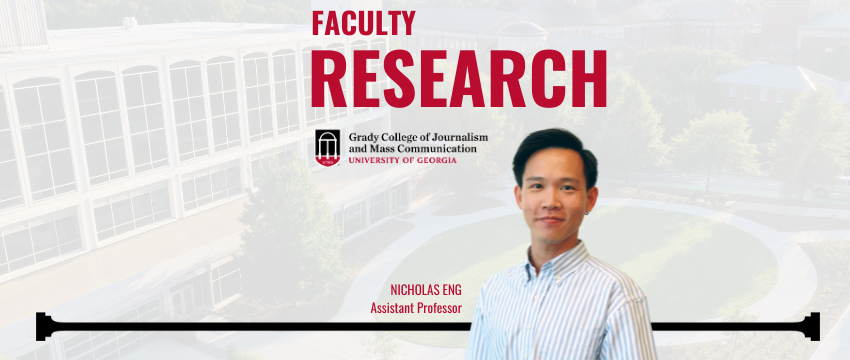Nicholas Eng studies human emotions in environmental and health message design

Nicholas Eng studies human emotions in environmental and health message design
Nicholas Eng has long been interested in emotion science and prosocial environmental and health messaging.
How people respond emotionally to different sequences of positive and negative environmental messages is the focus of his most recent research, “Awesome, Awful: Emotional Flow in Environmental Messaging,” which was published in the December 2023 issue of Media Psychology.
“I like doing work around mental well-being, climate change, corporate social advocacy or any sort of research focused on prosocial health and environmental outcomes,” said Eng, a first-year assistant professor in public relations. “Since I was really young, I have been very passionate about doing things that can have a positive impact on the world. Through research like this, I have the opportunity to do that.”
The research team studied how participants’ emotional responses might change when viewing beautiful, majestic imagery associated with environmental impact messages, versus imagery that shows destructive impacts. Respondents viewed a series of videos — some with beautiful, positive imagery; some with destructive, negative environmental imagery and some with positive imagery followed by a message of risk to our planet (and vice versa). The respondents were then asked a series of questions about how the videos made them feel and what actions they were likely to make after watching them.
The research found the biggest emotional impact were videos pairing a sequence of beautiful images of the environment with messaging about the risk of ongoing damage. This combination promoted a heightened sense of poignancy, or the “bittersweet” experience one feels when faced with a meaningful ending, which in turn led to greater intentions to share the message with others. While the sequenced videos did not predict participants intentions to advocate for environmental policy changes, sharing the video increases the likelihood that the pro-environmental message will reach a wider audience.
Eng hopes the research can provide some direction to those who are responsible for crafting environmental messaging and persuading different stakeholders to take climate action.
The study is co-authored by Chris Skurka, Nahyun Kim and Mary Beth Oliver.
Eng earned his doctorate degree from the Donald P. Bellisario College of Communications at Penn State University and has been interested in working on research around emotion science and persuasion after meeting with his doctoral advisor, Dr. Jessica Myrick. This interest continued to develop as Eng served as Skurka’s research assistant, whom he has collaborated with on several research projects including the Awesome, Awful research. Eng’s dissertation studied emotional appeals of mental health messaging.
Eng has had parallel interests in similar topics even before graduate school. His work as a communications lead with a social enterprise in Singapore directed efforts ranging from working with at-risk youth to develop organic farming entrepreneurship to consulting with MNCs to improve their waste management and recycling.
As Eng establishes his role at Grady College, he would like to invest his time and energy on similar research themes.
“I have always wanted to have a positive impact on others around me, and I can achieve that through research and mentoring,” Eng concluded. “It’s a great tie-in between my passion and my job.”
In addition to his doctorate degree, Eng has a bachelor’s degree in communication studies from Nanyang Technological University and an MS in communication from North Carolina State University.
Author: Sarah Freeman, freemans@uga.edu